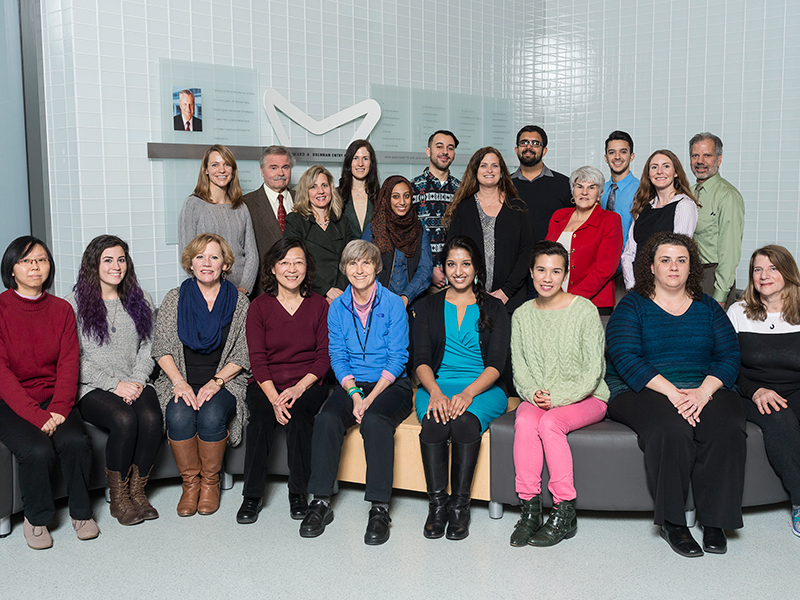
Back row: Christopher Goetz, MD; Leonard Verhagen, MD, PhD; Brandon Barton, MD
Middle row: Jennifer Goldman, MD, MS; Gian Pal, MD, MS; Cynthia Comella, MD; Deborah Hall, MD, PhD
Front row: Katie Kompoliti, MD; Kathleen Shannon, MD
The Rush Parkinson’s Disease and Movement Disorder Program is composed of a large and multidisciplinary team of clinical and laboratory researchers. The theme of this program is translational research, whereby new discoveries in the laboratory are brought to the clinical program to offer new treatments to patients, and equally important, discoveries from the clinical wing are studied in the laboratory to understand underlying scientific mechanisms.
The overall program has a three-part mission of excellence in patient care that is multidimensional and applicable to all phases and aspects of Parkinson’s disease and related disorders, research with leading-edge scientific studies and education for patients, families and health care professional. This research includes Parkinson’s disease, Huntington’s disease, dystonia, Gilles de la Tourette syndrome and tic disorders, Fragile X-related disorders and tremor conditions. The program is a designated research center funded by the Parkinson’s Disease Foundation, a Center of Excellence funded by the Huntington’s Society of America, a core center of the Dystonia Coalition, and a National Fragile X-associated Disorders Center. Other support is derived from governmental, foundation and donor support from grateful patients and families.
Learn more about the work of our faculty.
Christopher G. Goetz, MD
Cynthia L. Comella, MD
Deborah A. Hall, MD, PhD
Jennifer G. Goldman, MD, MS
Brandon Barton, MD, MS
Leo Verhagen, MD, PhD
Katie Kompoliti, MD
Christopher G. Goetz, MD, professor and director of the overall program is primarily interested in studying hallucinations, abnormal movements terms dyskinesia and rating measures to assess movement disorders. He is the co-principal investigator of a study aimed at treating dyskinesias in patients with Parkinson’s disease. This multicenter effort is sponsored by the Michael J. Fox Foundation. With sponsorship of the Movement Disorder Society, he is the director of a global program to translate key rating scales for Parkinson’s disease in multiple languages so that these scales can be used internationally and assess Parkinson’s disease impairments in multiple cultures with a unified and statistically sound measurement method. He has led efforts to study visual hallucinations in Parkinson’s disease, a core problem facing many patients, and with the application of new neuroimaging techniques, he has studied the anatomical basis of these phenomena. Upcoming plans will focus on further international collaborations for rating scales in an effort to establish valid measurement tools for Parkinson’s disease regardless of culture or language applied. Having set up a consortium of research teams committed to clinical trials of dyskinesia, he will continue to evaluate new therapeutic options to abate this problem. New neuroimaging strategies will also be applied to the study of hallucinations, expanding work from visual hallucinations to include other forms such as auditory, tactile and olfactory.
Cynthia L. Comella, MD, professor, focuses on two major areas of research. In Parkinson's disease, she works on exercise studies and clinical trials to modify disease symptoms. She conducts clinical trials in the disease currently focused on patients in the moderate stages with motor fluctuations. She recently collaborated on an NIH-funded project evaluating the effect of transcranial direct current stimulation (tDCS) administered during sleep on early morning akinesia in Parkinson disease. This study, now completed, was conducted using polysomnography, and Comella focused additional attention on collateral analyses of sleep architectural changes and patient sleep patterns with this novel intervention. Her second focus in in the area of dystonia, where she is an international leader. She led an NIH-funded project to describe dystonia and create rating scales for the disorder. She conducts clinical trials for dystonia, with an interest in new formulations of botulinum toxins and medications for patients who are not candidates for toxin. During this academic year, Dr. Comella has also worked with Drs. Goetz and Perry in collaboration with Ray Dorsey, MD, at the University of Rochester to set up a telemedicine program for patient care at Rush. The Movement Disorders program is ideal for telemedicine because 1) the specialty practice draws on a wide geographical area, 2) movement disorders is largely a visual field of medicine and 3) the patient population is sophisticated with computer technology. Her long-term aim is to incorporate telemedicine fully into both patient care and research, but the pilot program will start with a pilot feasibility assessment focusing on patients with Parkinson’s disease living more than 40 miles from Rush.
Deborah A. Hall, MD, PhD, professor, has two major areas of research. First, she conducts research in Parkinson’s disease with a focus on exercise intervention studies, clinical trials and genetics. She is head neurologist for a three-site NIH R01 to find the dose of exercise for PD patients. In addition, she is doing translational work with the monkey and mouse labs at Rush by conducting the human aim of a NIH R01 looking at biomarkers for Parkinson disease that can be targeted with medication. She is partnering on a project that is creating dopamine neurons from patient’s blood in the hopes of eventually conducting an autologous dopamine cell transplantation program. She is conducting DNA and RNA sequencing projects in Parkinson disease as principal investigator using next-generation sequencing and RNA expression by collaborating with teams of geneticists and statistical geneticists. Second, she investigates disorders associated with fragile X gene expansions. She is the director of the fragile X-associated Tremor Ataxia Syndrome Clinic, one of the only of its kind in the country, and works closely with Elizabeth Berry-Kravis head of molecular diagnostics at Rush. Hall has a NIH R01 to determine the impact of smaller expansions in neurological disorders including parkinsonism and cognitive decline. She is finishing a translational project to investigate molecular predictors of FXTAS. She also conducts studies in computed posturography and markerless motion systems in fragile-X-related disorders with Joan O’Keefe, PhD, in the Department of Anatomy.
Jennifer G. Goldman, MD, MS, associate professor, is conducting research studies to determine what causes cognitive, behavioral and emotional changes in patients with movement disorders, particularly Parkinson’s disease, Dementia with Lewy Bodies, and Huntington’s Disease, and how to improve treatments for these problems. These nonmotor aspects – including cognitive impairment, dementia, hallucinations, depression, and anxiety – present major challenges for patients and their caregivers, are often under-recognized, and lack optimal treatments. Dr. Goldman is the Director of the Neuropsychiatry (Cognitive Behavioral) program at the Rush Movement Disorder Center. Goldman’s research team at Rush University focuses on identifying key clinical features and biomarkers that are associated with neuropsychiatric features in movement disorders and then translating these findings into clinical therapies. Her research uses advanced multi-modal neuroimaging with brain MRI scans to assess the structure, function, and connections of the brain as well as genetics and other biomarkers. Her team has found that several key areas of the brain, which govern thinking, memory, and visual perceptions, look different on MRI scans in Parkinson’s patients experiencing cognitive problems and hallucinations. Drawing on these findings, Goldman is evaluating the role of these unique clinical and neuroimaging signatures to predict which patients are at risk for cognitive decline, hallucinations, and other neuropsychiatric symptoms. In addition, she is examining how the clinical and neuroimaging biomarkers can help guide interventions (e.g., medications, behavioral, exercise) to effectively treat or halt cognitive and behavioral symptoms. Goldman is conducting studies to develop improved clinical tools for assessing hallucinations and diagnosing mild cognitive impairment in Parkinson’s disease (PD-MCI). She is also investigating biomarkers that can be used to distinguish Parkinson’s from other atypical parkinsonian syndromes or aging. Her research involves collaborations, both locally and internationally, and this work has been funded by NIH, Michael J. Fox Foundation, Parkinson’s Disease Foundation, Rush University, Huntington’s Disease Society for America, among others.
Brandon Barton, MD, MS, assistant professor with a joint appointment at Rush and the Jesse Brown Veterans Administration Hospital, is interested in two major research areas: 1) Cognitive and medical aspects of Parkinson’s disease specifically among US Veterans and 2) Decision making and impulsivity in PD. He is working with data analysis and clinical outcomes experts in the VA system to analyze the collected data of a national sample of Veterans with PD. By studying war related factors such as Post Traumatic Stress Disorder (PTSD), Traumatic Brain Injury, and exposure to toxins such as Agent Orange, he is analyzing whether aspects of war and service in the military modulate risks for PD in veterans. With another project, in conjunction with other local VA hospitals, he has been gathering prospective data on risks and prevalence of dementia and mild cognitive impairment among veterans. In the coming year, he will be adapting electrophysiological tools used for the study of depression and PTSD in Veterans for the functional quantification of risky decision making in PD patients. This project is aimed at identifying brain wave patterns that are associated with impulsivity and risk taking can place patients with PD at high risk for dangerous behaviors. The goal is to identify tools to detect and quantify abnormalities in decision making in PD patients, with the idea that in clinical practice one can use simple and relatively cheap tools to study the tendency towards behavioral side effects of some PD medications. Many of the Rush patients are U.S. veterans, and they may benefit from the analysis of risk factors that predispose them to PD, and possibly lead to more specific treatments and evaluations in this sub-population of PD patients.
Leo Verhagen, MD, PhD, professor, is focused on deep brain stimulation, or DBS, in Parkinson’s disease and other movement disorders. Subthalamic nucleus (STN) DBS is effective for motor symptoms of PD but long-term patient-centered outcomes are lacking. Identification of long term patient centered outcomes of DBS will allow practitioners to better counsel potential DBS candidates. Verhagen is conducting a study to determine long-term patient-centered outcomes of bilateral STN DBS in PD, emphasizing satisfaction, quality-of-life and disability. His team developed a survey to query satisfaction in patients >5 years post-DBS, questioning expectations, satisfaction, willingness to hypothetically undergo DBS again, timing of DBS, and confidence in recommending DBS. Verhagen is also conducting studies to determine the accuracy of intraoperative CT during DBS procedures and comparing with postoperative MRI.
Katie Kompoliti, MD, professor, has a primary focus on Tourette syndrome and Functional Movement Disorders. She is almost ready to start a protocol studying a new compound, NBI-98854-1505, to treat tics in Tourette syndrome. She is also planning to study Cannabidiol (a compound found in cannabis) for tics in Tourette syndrome. Together with a physiatrist, she developed a protocol for acute comprehensive inpatient rehabilitation to treat patients with Functional Movement Disorders. Dr. Kompoliti has also being involved in studies investigating novel treatments for Tadive Dyskinesia. Finally she is participating in studies investigating a disease modifying intervention for Parkinson’s disease, an Adenosine A2A inhibitor for motor fluctuations in Parkinson’s disease and a new treatment for Dysautonomia in Parkinsonism.

